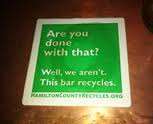It’s an aphorism repeated by local government employees that technology is always several generations behind the private sector.
Despite all the public rhetoric in support of government “acting like a business,” the priority to fund direct services to the public always gobbles up money that could be used to bring technology up to standard expected for employers of more than 12,000 people and budgets of more than $1.6 billion.
We’re able to log on to FedEx or our bank in the middle of the night to conduct business but we can only do that with selected functions on local government websites, a fact that hints at the ways that governments’ internal operating and financial systems are often behind the times in technological applications.
Keep on Truckin’
During budget hearings at City Council this year, we learned that the technology used by Memphis garbage trucks is more labor-intensive and less automated than other cities. Because of it, city government began a review of the equipment now being used and the impact of more modern equipment that can increase efficiency and decrease costs.
We can only hope that part of this review also addresses the need for City of Memphis to provide recycling for every citizen and business. We are particularly thinking of restaurant recycling, an idea whose time has already come but has never been possible because of vagaries like the size of garbage cans and handling systems on the trucks.
Local “green” crusader Margot McNeeley is a reminder of the power that one person with vision can have, as proven with her impressive impact with Project Green Fork. Its about two dozen restaurants alone have composted 79,000 gallons of food waste and recycled 597,000 gallons of glass, plastic and aluminum and 289 tons of paper and cardboard.
Finding Answers
However, the potential of her campaign is thwarted by a familiar public sector behavior – the skill of telling why something can’t be done rather than finding innovations to make it happen. Changing the culture of city government is a stated goal of the Wharton Administration and getting serious about restaurant recycling could be a strong symbol of its determination to change things.
The Green Restaurant Association in Boston estimates that a restaurant can produce an average of 150,000 pounds of waste a year. There are cities have used the carrot and others have used the stick, but we think Project Green Fork has created momentum for recycling that should be voluntary. After all, Chicago passed an ordinance in 1995 that all restaurants had to recycle three items (or one item as long as it made up at least 51 percent of the waste load excluding food waste), but it’s suspected that more than half of the city’s 10,000 restaurants don’t do it. It’s never been seriously enforced.
Obviously, it isn’t a stick if it’s not enforced, and at this point, we don’t think the city needs any new ordinances to enforce because there are old ones – like code enforcement – that need more attention. Perhaps, rather than city government seeing its role as provider of the service through sanitation services, it should consider acting as facilitator to make sure the service is providing, say, through private companies.
Restaurants Get It
We were thinking about this while reading about the bar and restaurant recycling program in other cities. Good karma and environmental stewardship aside, it’s good business. In a survey earlier this year by National Restaurant Association, 60% of consumers said they preferred to support restaurants that recycle. Even more compelling is that 85% said they are willing to sort items into the proper bins if they’re available.
According to the Association, about 65% of restaurants recycle something, mainly paper, cardboard, and glass and 13% compost organic food waste (a growing trend). Debunking some commentaries to the contrary, the best news of all is that 70% of restaurants said that the cost of business remained steady as a result of purchasing recyclables while only 18% said costs went up.
Here’s the kicker to more restaurant recycling: the most oft-cited obstacle that restaurants gave for failing to recycle was lack of infrastructure by their city’s government. That is particularly true for those in the South which has the lowest restaurant recycling rate of 46%. There are only few places as fully advanced as San Francisco that gives a discount on garbage collection fees if they recycle.
Piloting
Hamilton County (Cincinnati) last year ran a pilot program to test interest in restaurant recycling and within eight months, it had launched it in earnest. Cincinnati added new trucks to handle large rolling carts to encourage more restaurants to participate. Atlanta Recycles is another program encouraging waste reduction and recycling by local restaurants, borrowing from the National Restaurant Association’s Conserve Initiative, and last year, Los Angeles included commercial food waste in its hauler recycling rebate program.
We’ve written previously that based on the restaurant support for Project Green Fork in Cooper-Young, City of Memphis should test a pilot program there. Memphis City Councilman Bill Morrison and former City of Memphis Interim CAO Jack Sammons encouraged the program, but resistance by public works stymied it from even entering a pilot phase.
Restaurant recycling clearly is benefiting from momentum and public sentiment. Hopefully, this is a time when City of Memphis can be on the vanguard of progress rather than bringing up the rear.



We have a fast food chain in the northwest that has a great recycling program. Burgerville. Not only do they have the worlds best shakes and Walla-Walla onion rings, but they have a great recycling composting program: http://burgerville.com/sustainable-business/the-business-case/
If fast food can do it, anyone can do it.
Portland- Great example. Hopefully Project Green Fork and the city’s continued search for greater efficiencies will allow for the adoption of such practices.